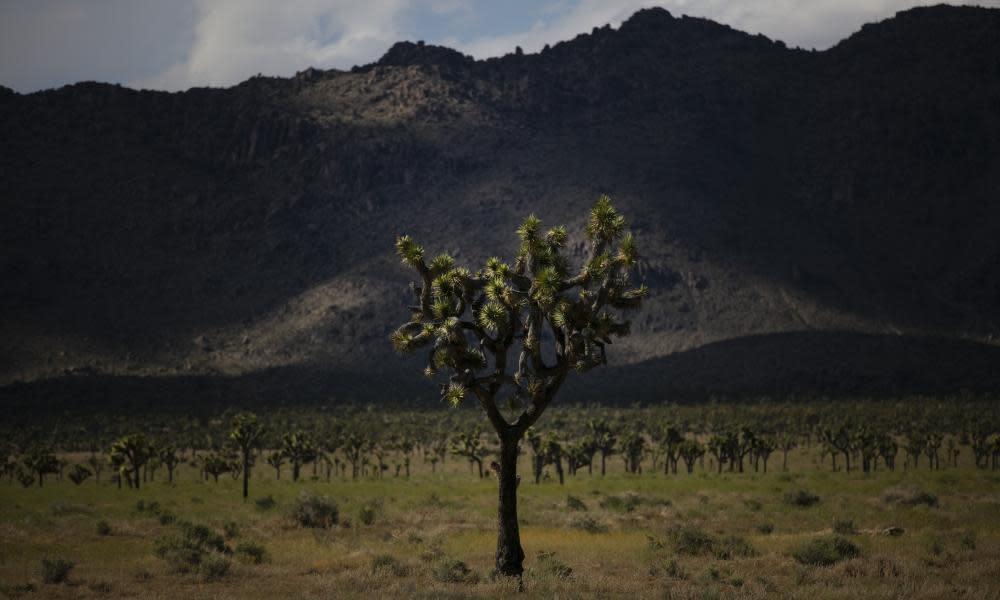California couple fined $18,000 for illegally uprooting 36 Joshua trees

A couple has been fined $18,000 after uprooting 36 Joshua trees to make space for a home and then burying them in a hole. Authorities hope the fine discourages others from mowing down the crooked-limbed plant, which is an imperiled species being considered for protection under California’s endangered species act.
“Most California citizens who reside in Joshua tree habitat revere these iconic desert species, more so now than ever because of its degraded population status,” Nathaniel Arnold, the deputy chief of the California department of fish and wildlife’s law enforcement division, said in a press release. “We hope it serves as a deterrent to others who may think it is acceptable to unlawfully remove Joshua trees to make way for development.”
Related: Historic heatwave, extreme drought and wildfires plague American west
Authorities started investigating the destruction of these Joshua trees – which are actually not trees, but a succulent named Yucca brevifolia – on 11 February, after a nearby resident spotted his neighbors using a tractor to fell dozens of the plants. The neighbor called the department of fish and wildlife tip line to report it, according to officials and the Los Angeles Times.
The neighbor reportedly warned the couple against removing the plants. Because the western Joshua tree is being considered for protection under the state’s endangered species statute, it is “illegal to disturb, move, replant, remove” them, officials said.
Douglas Poston, a prosecutor in San Bernardino county, reportedly said that the couple thought that Joshua trees under a certain diameter could be taken out. The couple owns the lot and wanted to build a home there.
“But that’s not accurate, obviously,” the Los Angeles Times quoted Poston as saying. “It doesn’t matter if it’s a foot tall or 20ft tall, it’s under that protection.”
When a state wildlife officer went to the property, “the suspects had left the scene,” but “he located what was clearly a freshly dug and refilled hole,” officials said. The wildlife officer used a backhoe to re-dig this hole, where he subsequently discovered the buried Joshua trees.
Officials filed a 36-count misdemeanor complaint against the couple on 7 June, alleging the “unlawful taking” of 36 Joshua trees. Each act of taking a Joshua tree can result in a fine of up to $4,100, and or six months in jail, officials said.
The couple, identified by authorities as Jeffrey Walter and Jonetta Nordberg-Walter, were “cooperative in the investigation”, the press release said. On 11 June, the San Bernardino county superior court placed the couple on a pre-trial diversion program.
Under their agreement with the court, Walter and Nordberg-Walter each have to pay a $9,000 fine. Part of this penalty has already been paid, and the couple could earn credit toward the fine if they volunteer for Joshua Tree national park, or the Mojave Desert Land Trust.
If the couple completes all of the pre-trial diversion requirements, their case will be dismissed. If they do not fulfill the requirements, prosecutors will proceed with the case against them, officials said. The couple could not immediately be reached for comment.
The dangers faced by Joshua trees have become increasingly dire. After the government shutdown that ended in late January 2019, park workers returned to Joshua Tree national park to find damaged trees, graffiti and destroyed trails. A retired park administrator said that the damage was “irreparable for the next 200 to 300 years”.
Researchers have said that because of the climate crisis, a mere .02% of the species’ present habitat in Joshua Tree national park would remain viable. Increasingly hot, dry weather has killed off Joshua trees, meaning there are fewer young ones that survive.
The Dome fire in August 2020 scorched more than 43,000 acres in some of the world’s densest old-growth Joshua tree forest in Mojave national preserve. Despite these challenges, local officials have stood in opposition to better protecting the Joshua tree, claiming that additional safeguards would thwart real estate development.

